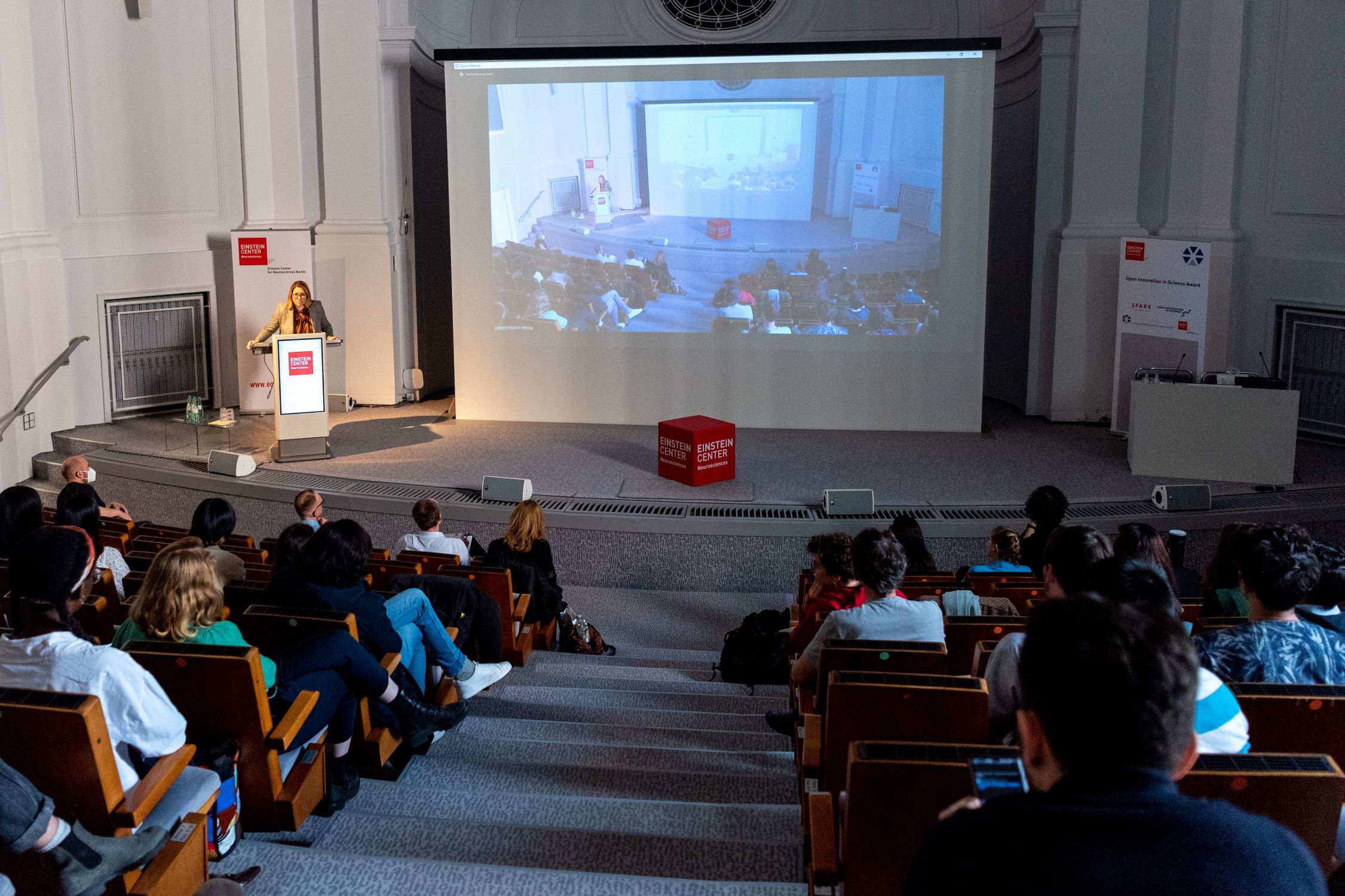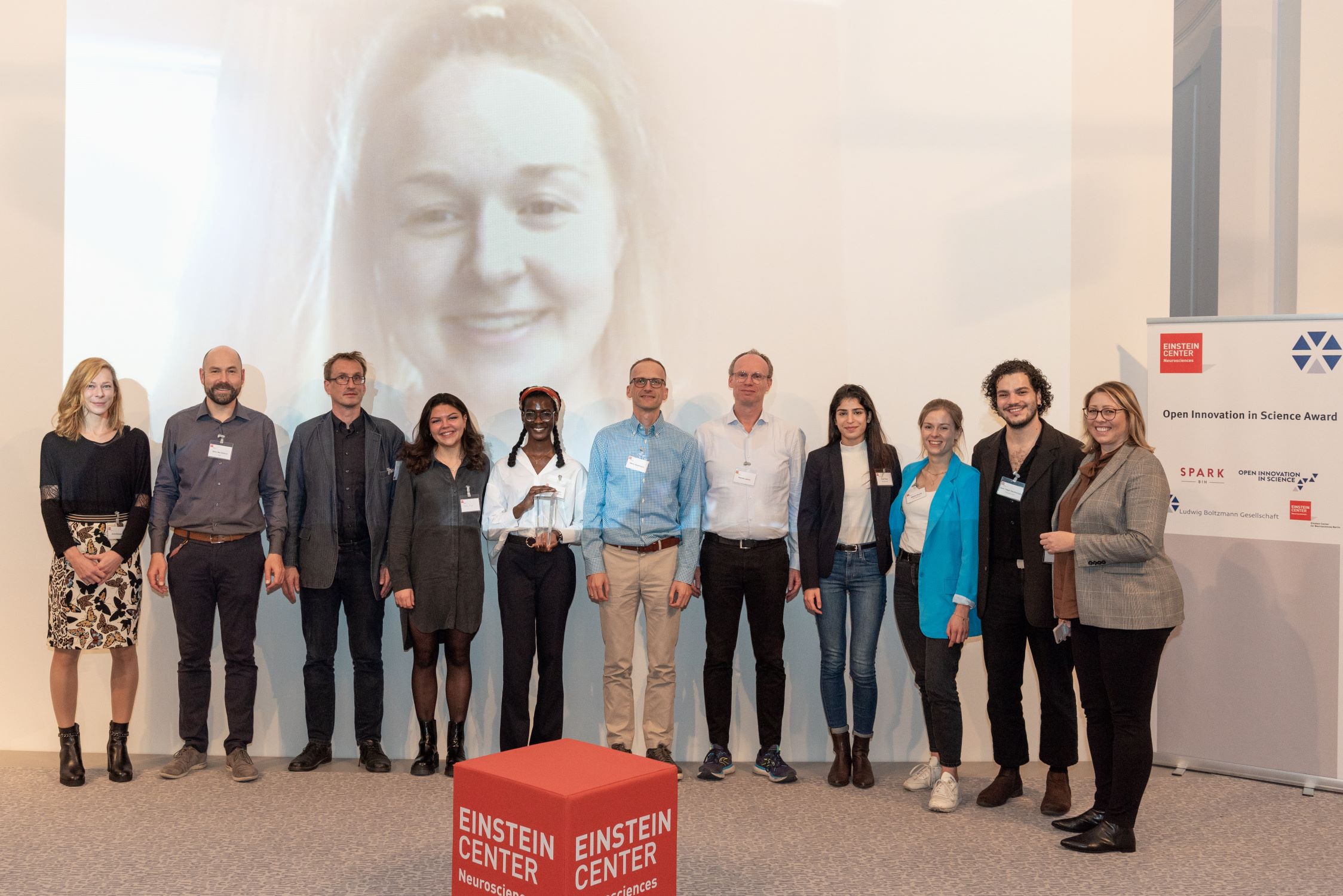Second ECN Open Innovation in Science Award
After a 2-year break due to the Covid-19 pandemic restrictions, the second edition of the Open Innovation in Science (OIS) Award took place in October 2022.
The aim of the OIS Award is to empower young researchers in neuroscience to integrate the principles of open innovation and open science into their research and translate scientific knowledge into innovation that would address current societal challenges. The award candidates who compellingly implement the collaborative and innovative approaches into their research receive financial support and expert training for further development and implementation of their projects.

The ECN PhD students submit their projects to the OIS Award as part of their PhD training. Nevertheless, the OIS Award is an open opportunity for all the Berlin-based neuroscientists.
Call
We received a total of 12 eligible project proposals in 2022 from ECN and non-ECN scientists.
After a careful selection by the interdisciplinary jury, several projects were shortlisted and raised to the next phase of the competition.
Members of the jury:
- Patrick Lehner (LBG OIS Center, Vienna, Austria)
- Prof. Dr. Marion Poetz (LBG OIS Center, Vienna, Austria & Copenhagen Business School, Denmark)
- Dr. Henry Sauermann (European School of Management and Technology, Berlin)
- Dr. Anne Schwerk (Berlin Institute of Health, Berlin)
Shortlist:
- Milena Musial, Florian Schlagenhauf, Claudia Ebrahimi (Charité - Universitätsmedizin, Berlin); Tanja Endrass (Technische Universität Dresden, Dresden)
- Lara Faraj (Charité - Universitätsmedizin, Berlin)
- Linda Kokwaro, Helena Krüger, Dr. med. Stefanie Schreiter (Charité - Universitätsmedizin, Berlin)
- Yasat Hacibaloglu (Leibniz-Forschungsinstitut für Molekulare Pharmakologie, Berlin)
- Fiona O' Donovan (Charité - Universitätsmedizin, Berlin)
Award
The ECN OIS Award 2022 was a public event, during which the shortlisted candidates received the opportunity to present their projects in 3-minute pitches in front of the OIS expert panel.
Project Pitches & Award Ceremony: Friday, October 14, 2022
Venue: Lecture Hall, Kaiserin-Friedrich-Haus, Robert-Koch-Platz 7, 10115 Berlin
Moderation Project Pitches: Prof. Dr. Marion Poetz (LBG OIS Center, Vienna, Austria & Copenhagen Business School, Denmark)
Moderation Award Ceremony: Dr. Anne Schwerk (Berlin Institute of Health, Charité - Universitätsmedizin, Berlin); Dr. Oliver Mai-Kolerus (Einstein Center for Neurosciences, Berlin)
Winner:
Fiona O' Donovan (Charité - Universitätsmedizin, Berlin)
Topic: Open Innovation in Science & MRI Research
The second advantage of implementing OIS in my research would be getting the public engaged in my research. I really enjoy informing people about my research and getting them interested in what I study. Early-life stress is something that many people are interested in and have also experienced during their life. In recent times there has also been a rise of this topic in the media. Often times when information about early life stress is broadcasted it is misconstrued or is used to scare people to attract them to a headline. I believe for the health of society it is important to correctly communicate information about early life stress to the public.
Runner-up:
Linda Kokwaro, Helena Krüger, Dr. med. Stefanie Schreiter (Charité - Universitätsmedizin, Berlin)
Topic: Digital Health Applications (DHA) for People with Bipolar Disorder
The planned OIS project idea contributes to the development and access to new technology-based tools like DHA for people with severe mental illnesses like BD. So far DHA have been focused on more mild mental disorders like mild depression or anxiety. From a company's perspective, engaging in lower risk with more mildly affected patient groups is understandable due to higher functioning and lower rates of hospitalization or suicidality and no chronic disease path. Considering the high burden of disease and loss of quality of life and functioning in people with BD, not exploring potential new technologies like DHA would be a missed opportunity to improve current care on a patient as well as societal level.
All project pitches:
Milena Musial (Charité - Universitätsmedizin, Berlin)
Topic: This time for real: Deciphering the computational underpinnings of addiction by designing an ecologically valid decision-making paradigm
View pitch video
Yasat Hacibaloglu (Leibniz-Forschungsinstitut für Molekulare Pharmakologie, Berlin)
Topic: Translational and Multidisciplinary Applications of Crosslinking Mass Spectrometry in Neurological Disorders
View pitch video
Lara Faraj (Charité - Universitätsmedizin, Berlin)
Topic: Neurotracker: Deciphering Neurodevelopmental Disorders
View pitch video
